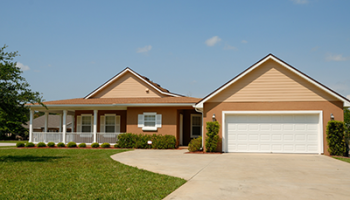The Ultimate Guide To Home Renovation Loans From The FHA
The Ultimate Guide To Home Renovation Loans From The FHA
The Federal Housing Administration (FHA) can be an excellent place to turn when you're in need of a mortgage, but FHA loans can have a lot of moving parts. An FHA mortgage can be a bit more difficult in some ways but can also be more forgiving in other ways. It is important to make sure you are using a mortgage broker that understands how to navigate the FHA loan process.
Here are some of the most frequently asked questions on renovation loans from the FHA. Is a renovation loan right for you? Read on to learn more:
How does a home renovation loan work?
We sat down to discuss FHA renovation mortgages with D. Shane Whitteker, owner and chief broker at Williamsport Pennsylvania mortgage broker Principle Home Mortgage. He specializes in helping his clients find the best mortgage for their situation.
“A renovation loan is designed to fund the costs of home improvement,” Whitteker says. “The work has to be done by a contractor but in very limited situations the borrower can do their own work.”
According to Whitteker, the FHA renovation loan (203K) has both similarities and differences when compared to other types of mortgages.
“The mortgage process is similar to any other mortgage as far as approval and underwriting. The main differences are allowed loan to value and how the loan amount is calculated,” Whitteker says. “The FHA renovation loan allows for up to 110% of the after improved appraised value as the loan amount. This really helps to cover the expenses of a home renovation.”
When compared to a conventional renovation loan, Whitteker says the differences become clear.
“The conventional renovation loan doesn’t work quite that way,” Whitteker says. “You typically are able to get up to 95% of the after improved appraised value as your loan amount on the conventional loan. So you need more equity with the conventional option.”
What type of loan is best for home improvements? Whitteker likes the FHA 203K.
“In my opinion the FHA 203K is the better option overall when considering a renovation loan,” Whitteker says.
The FHA 203k loan is specifically engineered for financing home improvements. Homeowners around the country use FHA 203k loans to finance:
• Bathroom upgrades
• New kitchens
• Deck and patio renovations
• Upgrading windows
• Basement upgrades
Can you borrow more on a mortgage from home improvements? According to Whitteker, the answer is yes.
“Yes, both conventional and FHA mortgages allow the loan to value and loan amount to be set from the after improved value of the home,” Whitteker says. “Sothe appraiser reviews the work that is to be completed and takes that work into consideration when developing the analysis for the appraised value. FHA also expands their allowable loan to value to 110% which is a real benefit for those considering renovations that have somewhat limited equity.”
Is a renovation loan a good idea?
A renovation loan can be a great idea if you have some specific improvements in mind. This type of loan works particularly well if you own property in a market where prices are rising. According to Whitteker, it all depends on you, the borrower.
“I think so, depending on the wants and needs of the borrower,” Whitteker says. “You can create the home you want without having to move and pay for things like realtor commission when selling your home. You as the borrower have more control over creating the home you want. There are a number of benefits to a renovation loan.”
Am I able to use a 203K loan on a single-family home? How about a multi-family home, a townhouse, or a condo?
Yes, all of these types of homes are eligible properties, Whitteker says.
“The most restrictive would be a condo. FHA has a process of approving condos so that they can qualify for FHA financing and there is no guarantee this will occur,” Whitteker warns. “So I would say the options are more limited for someone that owns a condo unless HUD has already approved that condo project for FHA financing.”
Does my home need to be appraised before I can get a home renovation loan?
Yes, the home must be appraised.
“On a refinance many times we actually have to have two appraisals done,” Whitteker says. “This is one of the few negative aspects of the 203K.”
In addition, the lender will want a list of the contractors that you will be working with. You should expect the lender to be in communication with your appraiser throughout the process.
What is a contingency fund?
In the context of a 203k loan, a contingency fund is a reserve of money that is set aside to cover any unanticipated costs of your renovation project.
“This is set at a minimum of 10% of the total amount of work plus required FHA add-ons and a maximum of 20%,” Whitteker explains.
I have a rental property in need of repairs. Can I use a 203K loan?
“No,” Whitteker says. “The 203K loan is only available for primary residences.”
If I qualify for a 203K renovation loan, then how will I receive the money?
This depends, Whitteker says.
“Depending on the type of 203K being done you will either receive half of the money at funding and the other half at completion of the renovation or you will be set up on a draw schedule.”
Am I allowed to do the home repairs myself with a 203K renovation loan?
“Typically the answer to this is no but in certain limited circumstances this is allowed,” Whitteker says. “Basically the borrower would need to be a licensed and experienced contractor in order to be allowed to do the work themselves.”
I am finished with my home renovation project, but I still have some money remaining. What should I do with the excess money?
Your lender will usually apply these funds to the remaining principal on your original mortgage. According to Whitteker, this does not change your payment or any other terms of the mortgage other than decreasing the principle balance of the mortgage.
Am I required to have a consultant for a 203K loan?
This depends on the type of repairs and the type of 203K, Whitteker says.
“If your renovation cost including all 203K related expenses comes in under $35,000 you most likely can do a limited 203K which does not require a consultant unless certain types of work are being done,” Whitteker says.
Considering structural work? You’ll need a consultant.
“If any structural work is being done you will need a consultant regardless of the cost of renovation,” Whitteker says. “Some banks also require a consultant regardless of the type of 203K being done.”
The bottom line? Whitteker says it’s never a bad idea to have a knowledgeable advocate on your side.
“Over all in my opinion it is a good idea to have a HUD consultant,” Whitteker says. “There is a cost associated but they are a good advocate for the homeowner or home buyer, providing a buffer between the borrower and contractor and helping to keep any problems from occurring.”
To learn more about FHA 203K renovation loans, contact the Williamsport mortgage experts at Principle Home Mortgage, 814-308-0959.
VA Home Loans In Williamsport: A Primer
If you're looking for a Williamsport VA home loan, this article will give you a solid foundation. VA home loans - in Williamsport or anywhere else in Pennsylvania - are one of the best ways to obtain a home mortgage.
Step-By-Step Guide to Being a First Time Home Buyer
As a first time home buyer, you'll have a lot of questions. Check out our Williamsport First Time Home Buyer Guide for answers.
First Time Williamsport Home Buyer Mortgage Tips: The Inside Scoop
If you're considering buying a home in Williamsport - or anywhere else in Pennsylvania, you're guaranteed to learn something new in this informative guide.




